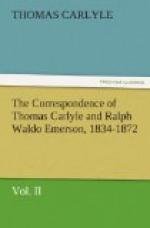Having not one spare moment at present, I will answer to you only the whole contents of that letter; you in your charity will convey to Mr. Wight what portion belongs to him. Wight, if you have a chance of him, is worth knowing; a genuine bit of metal, too thin and ringing for my tastes (hammered, in fact, upon the Yankee anvils), but recognizably of steel and with a keen fire-edge. Pray signify to him that he has done a thing agreeable to me, and that it will be pleasant if I find it will not hurt him. Profit to me out of it, except to keep his own soul clear and sound (to his own sense, as it always will be to mine), is perfectly indifferent; and on the whole I thank him heartily for showing me a chivalrous human brother, instead of the usual vulturous, malodorous, and much avoidable phenomenon, in Transatlantic Bibliopoly! This is accurately true; and so far as his publisher and he can extract encouragement from this, in the face of vested interests which I cannot judge of, it is theirs without reserve....
Adieu, my friend; I have not written so much in the Letter way, not, I think, since you last heard of me. In my despair it often seems as if I should never write more; but be sunk here, and perish miserably in the most undoable, least worthy, most disgusting and heart breaking of all the labors I ever had. But perhaps also not, not quite. In which case—
Yours ever truly at any rate,
T.
Carlyle
No time to re-read. I suppose you can decipher.
CLXVII. Carlyle to Emerson
Chelsea, 29 January, 1861
Dear Emerson,—The sight of my hand-writing will, I know, be welcome again. Though I literally do not write the smallest Note once in a month, or converse with anything but Prussian Nightmares of a hideous [nature], and with my Horse (who is human in comparison), and with my poor Wife (who is altogether human, and heroically cheerful to me, in her poor weak state),—I must use the five minutes, which have fallen to me today, in acknowledgment, due by all laws terrestrial and celestial, of the last Book* that has come from you.
-------- * “The Conduct of Life.” --------
I read it a great while ago, mostly in sheets, and again read it in the finely printed form,—I can tell you, if you do not already guess, with a satisfaction given me by the Books of no other living mortal. I predicted to your English Bookseller a great sale even, reckoning it the best of all your Books. What the sale was or is I nowhere learned; but the basis of my prophecy remains like the rocks, and will remain. Indeed, except from my Brother John, I have heard no criticism that had much rationality,—some of them incredibly irrational (if that matter had not altogether become a barking of dogs among us);—but I always believe there are in the mute state a great




